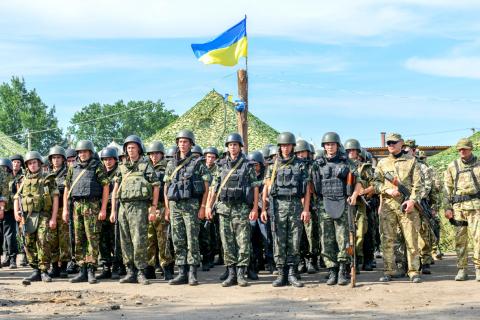Russian President Vladimir Putin yesterday lamented the latest round of US sanctions against his country, saying they would stalemate bilateral relations and hurt not only Russian, but also US businesses.
Russia’s benchmark MICEX was down 2.9 percent in late afternoon trading on news of the sanctions, while its biggest oil company, Rosneft, was nearly 5 percent down.
Putin’s comments came hours after US President Barack Obama announced broader sanctions against Moscow, targeting two major energy firms including Rosneft, two powerful financial institutions, eight weapons firms and four individuals.

Photo: AFP
The increased US economic pressure is designed to end the insurgency in eastern Ukraine that is widely believed to be backed by the Kremlin.
However, the US penalties stopped short of the most stringent actions the West has threatened, which would fully cut off key sectors of Russia’s oil-dependent economy. US officials said those steps were still on the table if Russia fails to abide by the West’s demands to stop its support for the pro-Russia insurgents who have destabilized eastern Ukraine.
In televised comments yesterday, Putin said the sanctions are “driving into a corner” relations between the two nations as well as the interests of US companies and “the long-term national interests of the US government and people.”
Putin warned the US that the sanctions would create a backlash against US firms working in Russia.
The most noticeable firms on the list are Rosneft and Russia’s largest independent gas producer, Novatek. Both are now barred from getting long-term loans from US entities.
Russian Prime Minister Dmitry Medvedev in televised remarks said the sanctions are throwing Russia’s relations with the West “back to the 1980s” and added that Russia “will have to pay more attention to military and security spending.”
Putin made no mention of the additional sanctions levied on Wednesday by the 28-nation EU, which urged the European Investment Bank to sign no new financing agreements with Moscow and said that it was suspending operations in Russia financed by the European Bank for Reconstruction and Development.
European nations have much closer energy and other economic ties with Russia and have not imposed as tough sanctions as the US.
However, the Russian foreign ministry did lash out at the EU’s new sanctions, accusing Europe of “giving in to the bullying of the US administration.”
Meanwhile, the Ukrainian military yesterday said Russian jets shot down a Ukrainian Su-25 fighter plane that was on military operations over the east of the country.
It was the first time Kiev had directly accused Moscow of using air power in the war. The pilot safely ejected, Andriy Lysenko, a spokesman for Ukraine’s National Defense and Security Council, told reporters.
Russia’s defense ministry declined to comment.

The Ministry of the Interior (MOI) is to tighten rules for candidates running for public office, requiring them to declare that they do not hold a Chinese household registration or passport, and that they possess no other foreign citizenship. The requirement was set out in a draft amendment to the Enforcement Rules of the Public Officials Election and Recall Act (公職人員選舉罷免法 ) released by the ministry on Thursday. Under the proposal, candidates would need to make the declaration when submitting their registration forms, which would be published in the official election bulletin. The move follows the removal of several elected officials who were

The Republic of China (ROC) is celebrating its 114th Double Ten National Day today, featuring military parades and a variety of performances and speeches in front of the Presidential Office in Taipei. The Taiwan Taiko Association opened the celebrations with a 100-drummer performance, including young percussionists. As per tradition, an air force Mirage 2000 fighter jet flew over the Presidential Office as a part of the performance. The Honor Guards of the ROC and its marching band also heralded in a military parade. Students from Taichung's Shin Min High School then followed with a colorful performance using floral imagery to represent Taiwan's alternate name

FOUR DESIGNATED AREAS: Notices were issued for live-fire exercises in waters south and northwest of Penghu, northeast of Keelung and west of Kaohsiung, they said The military is planning three major annual exercises across the army, navy and air force this month, with the navy’s “Hai Chiang” (海強, “Sea Strong”) drills running from today through Thursday, the Ministry of National Defense said yesterday. The Hai Chiang exercise, which is to take place in waters surrounding Taiwan, would feature P-3C Orion maritime patrol aircraft and S-70C anti-submarine helicopters, the ministry said, adding that the drills aim to bolster the nation’s offshore defensive capabilities. China has intensified military and psychological pressure against Taiwan, repeatedly sending warplanes and vessels into areas near the nation’s air defense identification zone and across

A Chinese takeover of Taiwan would severely threaten the national security of the US, Japan, the Philippines and other nations, while global economic losses could reach US$10 trillion, National Security Council Deputy Secretary-General Lin Fei-fan (林飛帆) wrote in an article published yesterday in Foreign Affairs. “The future of Taiwan is not merely a regional concern; it is a test of whether the international order can withstand the pressure of authoritarian expansionism,” Lin wrote in the article titled “Taiwan’s Plan for Peace Through Strength — How Investments in Resilience Can Deter Beijing.” Chinese President Xi Jinping’s (習近平) intent to take Taiwan by force